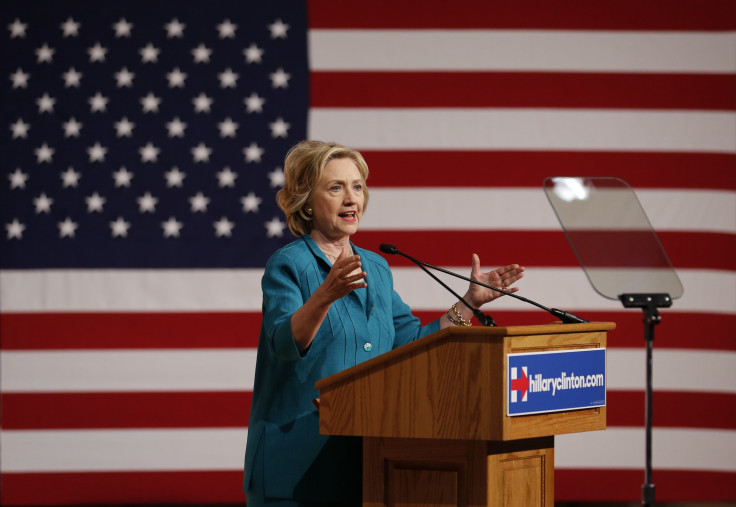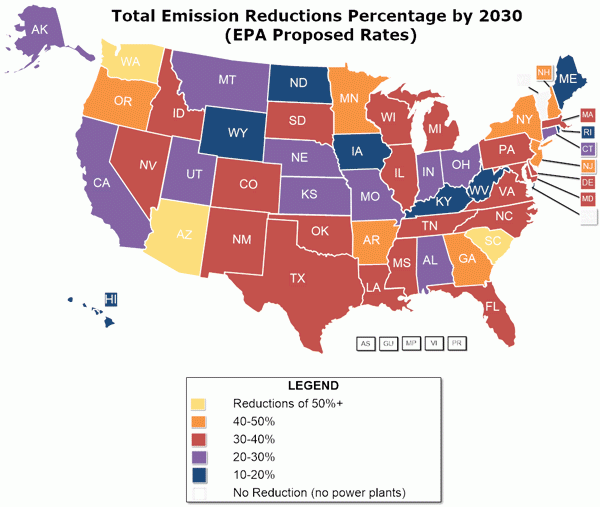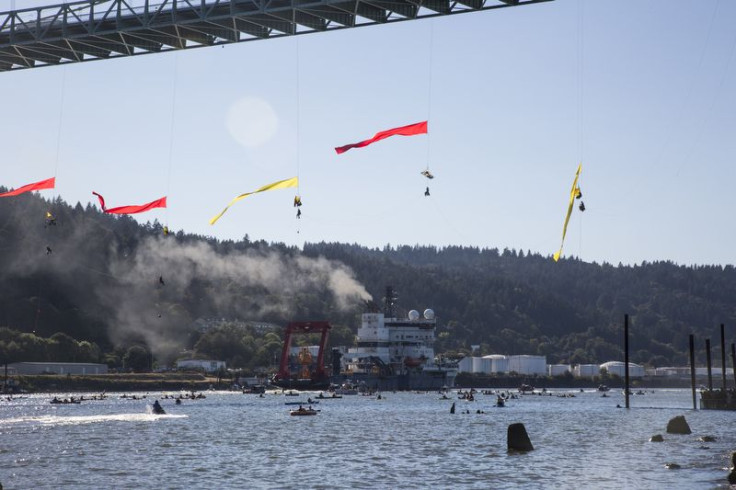Hillary Clinton Backs Obama's Climate Change Plan, But Environmentalists Frustrated

Democratic White House hopeful Hillary Clinton said Sunday she'll uphold the Obama administration's key climate change policies if elected and defend them against Republican-led opposition. The former U.S. secretary of state was the first 2016 presidential candidate to respond to President Barack Obama's Clean Power Plan, which could be announced as soon as Monday.
The plan is "a significant step forward in meeting the urgent threat of climate change," Clinton said in a Sunday statement cited by the Washington Post.
Obama is expected to unveil the Clean Power Plan after more than a year of review by the U.S. Environmental Protection Agency. The latest version will require states to curb carbon dioxide pollution from power plants by 32 percent by 2030, compared with 2005 levels. The rules are designed to encourage state and utility investment in solar, wind and other renewable energy supplies while discouraging spending on dirtier power sources, such as coal and fuel oil.
"It drives investments in clean energy and energy efficiency, reduces asthma attacks and premature deaths, and promotes a healthier environment and a stronger economy," Clinton said in the statement. "It’s a good plan, and as president, I’d defend it."

Clinton's remarks arrive a week after the Democratic front-runner unveiled her own climate plan during a campaign stop in Iowa. On July 26, she set a goal to produce 33 percent of U.S. electricity from renewable sources by 2027, up from 7 percent today. Obama's current targets call for 20 percent renewables within 15 years.
She also called for installing a half-billion solar panels in the U.S. by 2020 -- or seven times today's solar power capacity -- and to generate enough clean energy within 10 years of her inauguration to power every home in America.
Republicans swiftly criticized Clinton's climate change initiatives, arguing the proposals would raise Americans' electricity costs and decimate jobs and investments in the fossil fuel and manufacturing industries. Obama's Clean Power Plan is facing similar criticisms from GOP policymakers and more than a dozen governors.
Environmentalists and clean energy supporters meanwhile largely praised Clinton's climate proposals.
Yet many green groups say they're still frustrated with the Democratic candidate, who has kept silent on other key environmental issues -- and whose track record as a politician and philanthropist suggests enduring ties with the fossil fuel industry. Her campaign chair, John Podesta, recently served as Obama's adviser on climate change policy.
"Hillary Clinton is just half the way there," Bill McKibben, who heads 350.org, a national grassroots environmental organization, told the New York Times last week. " We need Clinton to show she understands the other half of the climate change equation — and prove she has the courage to stand up against fossil fuel projects like offshore and Arctic drilling, coal leasing in the Powder River basin, and the Keystone XL pipeline.”
Clinton on July 28 declined to say whether she supported the Keystone XL pipeline, the controversial 1,179-mile conduit that would connect Canadian oil sands operations in Alberta to refineries on the Texas Gulf Coast.

Proponents say the pipeline is essential to expanding North American oil production. But Canadian oil sands crude is a particularly carbon-intensive resource, since it requires enormous amounts of energy to extract, process, refine and transport. McKibben and other environmentalists argue that building the Keystone XL would lead to a rise in greenhouse gas emissions and undermine any government attempts to cut carbon.
Clinton told a New Hampshire voter last week that she wants to "wait and see" what Obama decides before offering her opinion on the project. The president has the final say on whether the TransCanada Corp. pipeline gets built because it crosses an international border.
"If it is undecided when I become president, I will answer your question," Clinton added.
Another major sticking point with green voters is Clinton's past support for offshore energy drilling. In 2006, as a New York junior senator, Clinton sided with Republicans and oil-state Democrats by voting to open an additional 8 million of acres of the Gulf of Mexico to oil and gas drilling. Sen. Barbara Boxer, D-California, and other climate champions opposed the measure, expressing concern of widespread coastal pollution and increased climate emissions.
The Obama administration earlier this year approved drilling in Alaska's Chukchi Sea and gave Royal Dutch Shell PLC to go-ahead to drill two oil exploration wells. Environmental activists last week blocked a Shell icebreaker docked in Portland, Oregon, that was destined for Alaska's Arctic Coast. The MSV Fennica eventually managed to maneuver through a blockade of Greenpeace activists who dangled from St. Johns Bridge and floated around in kayaks.
Her campaign has not yet publicly addressed the offshore drilling issue. "I have doubts about whether we should continue drilling in the Arctic," Clinton told NH1's Paul Steinhasuer on July 29. "And I don't think it is a necessary part of our overall clean energy climate change agenda."
She added, "I will be talking about drilling in general, but I am skeptical about whether we should give the go ahead to drill in the Arctic."

Still, Clinton isn't expected to be hard on Big Oil, observers say. The Clinton Foundation, the charitable foundation she runs with her husband, former U.S. President Bill Clinton, has received millions of dollars from Exxon Mobil Corp. and ConocoPhillips in recent years. An International Business Times investigation revealed the foundation accepted donations from Pacific Rubiales, a Canadian oil company accused of human rights violations in Colombia.
The Clinton Foundation has maintained the donations are solely support its philanthropic mission. "As with other global charities, the Clinton Foundation receives the support of individuals, organizations, and governments from all over the world because our programs are improving the lives of millions of people," spokesman Craig Minassian told National Journal in February, as news of the oil company donations broke.
Environmental leaders said they weren't convinced. "We've long been concerned about Hillary Clinton's ties to the oil and gas industry," Ben Schreiber, the climate and energy program director for Friends of the Earth, told the publication. "We're concerned about the influence that these petrodollars have."
© Copyright IBTimes 2024. All rights reserved.




















